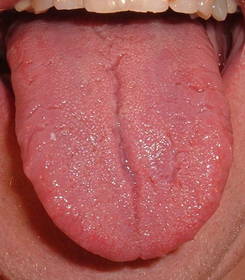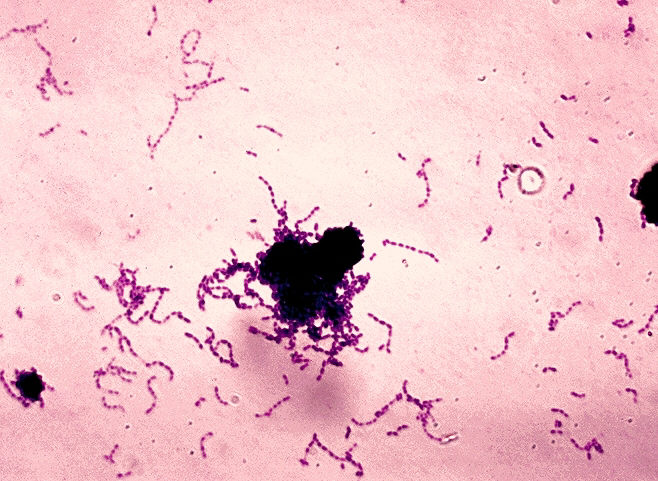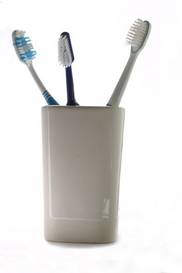Bacteria and Bad Breath
Interview with
Helen - Marcello Riggio from the University of Glasgow has been studying the bacteria of the mouth. Hello Marcello.
Marcello - Hello, good evening.
Helen - Thanks for joining us on the show today. What sort of bacteria do we find living in the average mouth?
 Marcello - The mouth is composed of many, many hundreds of bacteria: each with different properties. At the last count there were approximately 700 species that had been identified. However, only about half of those can actually be physically grown in the laboratory. It's a really diverse population of bacteria within the mouth. Obviously we have a number of good bacteria which will promote good oral health and unfortunately we have a number of bad bacteria which are involved in some nasty oral diseases.
Marcello - The mouth is composed of many, many hundreds of bacteria: each with different properties. At the last count there were approximately 700 species that had been identified. However, only about half of those can actually be physically grown in the laboratory. It's a really diverse population of bacteria within the mouth. Obviously we have a number of good bacteria which will promote good oral health and unfortunately we have a number of bad bacteria which are involved in some nasty oral diseases.
Chris - What sort of densities do you find these bacteria in, Marcello, if you were to take a swab from the mouth? People talk about a table-top: on each square centimetre of some desks 20,000 bacteria per square centimetre. What would be the numbers that you would get from the mouth?
Marcello - It depends on which part of the mouth you were actually looking at. The tongue which is the area of the mouth which harbours bacteria, which cause bad breath, has a very dense population of bacteria. You're really talking in terms of millions of bacteria in a small surface area. It really is bacterial-rich environment.
Chris - It's a bacterial banquet.
Marcello - Yes!
Chris - Why do we have them there? Is it purely because we can't do without them, is it because we can't stop them being there or is it because they actually do something useful?
Marcello - First of all, we can't stop them being there. Bacteria are present throughout the human body so the mouth isn't any different from the rest of the body. There are a number of bacteria which have been identified. One in particular, which is certainly classified as a good bacterium that people have found is present in higher levels in a healthy mouth compared to somebody who's got bad breath for example. The good bacteria are there to swamp out the bad bacteria to keep it in simple terms.
Chris - What about tooth decay? Is that down to the same bacteria and are there therefore more people who have tooth decay-prone bacterial types in their mouths?
 Marcello - The bacteria that cause tooth decay, dental caries and periodontal disease which is the disease that results in you actually losing the teeth. There are distinct bacteria associated with each of these types of diseases. If you look at dental caries, dental caries is loss of the enamel on the tooth surface. That is caused by bacteria which are very good at producing acids, particularly Streptococcus mutans and a few helper bacteria. If we look at things like periodontal disease and gingivitis, gingivitis is the swelling and bleeding of the gums, there are specific bacteria associated with that and the associated, more severe form of the disease known as periodontal disease.
Marcello - The bacteria that cause tooth decay, dental caries and periodontal disease which is the disease that results in you actually losing the teeth. There are distinct bacteria associated with each of these types of diseases. If you look at dental caries, dental caries is loss of the enamel on the tooth surface. That is caused by bacteria which are very good at producing acids, particularly Streptococcus mutans and a few helper bacteria. If we look at things like periodontal disease and gingivitis, gingivitis is the swelling and bleeding of the gums, there are specific bacteria associated with that and the associated, more severe form of the disease known as periodontal disease.
Chris - Returning to what can really be described as radioactive breath, halitosis, is that linked to bacteria in the mouth?
Marcello - Very much so. Halitosis is a term, and it comes from the Latin: halitus, meaning breath and osis, meaning awful condition. It's defined as an abnormally odorous condition of the breath. It is well documented that it is caused principally by bacteria. There are various different types of bad breath; different causes. We can have what is known as genuine halitosis which can be either physiological or pathological. Genuine halitosis, which is physiological is caused by bacteria on the rear surface of the tongue. We've done a very large study trying to identify those particular bacteria. You can also have bad breath, as I'm sure you all know, from eating smelly things in the diet. Things such as onions, garlic and other spices: that sort of bad breath is transient and disappears fairly quickly. We were more interested in our own research to look at long-term bad breath or halitosis, caused bacterial metabolism on the rear surface of the tongue.
 Chris - Do you think certain people are more likely to carry the types of bacteria that give you bad breath and therefore it tends to associate with certain people? For instance, if I had a partner who tended to have smelly breath and I kissed them a lot could I then end up infecting myself with the same bacteria so I would then also get smelly breath?
Chris - Do you think certain people are more likely to carry the types of bacteria that give you bad breath and therefore it tends to associate with certain people? For instance, if I had a partner who tended to have smelly breath and I kissed them a lot could I then end up infecting myself with the same bacteria so I would then also get smelly breath?
Marcello - At the moment we're not absolutely certain which bacteria are the major culprits which cause bad breath. However, in our own study we have shown that the overall presence of bacteria in people with and without bad breath are pretty much the same. What we actually see is a change in the numbers of specific bacteria in people with bad breath compared to those who don't have bad breath. It seems to be relative amounts of bacteria are shifted in a proportion of a particular species of bacteria that causes the bad breath. In effect we all do possess the bacteria that cause the bad breath but those of us without the bad breath have them in a much lower number.
Wally Mandlebrot in Second Life commented: "I'll remember this next time I kiss someone!"
Marcello also answered these listener questions:
From Troy McLuhan, Second Life:
They say there's something called fight bite which happens when people get bitten by other people. They get a bad infection. What's that all about?
Marcello - Bacteria can easily be transmitted through bites. Bacteria in the oral cavity are designed to stay there, actually. They can get to other parts of the body and cause more serious diseases. If one were able to transmit some of these more opportunistic oral bacteria to other body sites then yes, they can cause serious infections.
From Diane:
I'd heard in the past that oral bacteria can cause heart valve problems and hip joint infections. Is this true and which bacteria are involved?
Marcello - Yes, oral bacteria can be transported around the body and the blood. If they can get into the blood stream they can be transported to various body sites and cause far more serious systemic infections. You're quite right. You mentioned two infections: endocarditis, which is an infection of the heart valves in the inner lining of the heart and hip joint infections. There are a number of bacteria that do cause endocarditis, for example. These tend to be Staphylococci and Streptococci. There are a number of other oral bacteria which have also been implicated in that. We've carried out a study looking at prosthetic hip joint infections, looking at the types of bacteria which are involved in these particular infections. We've identified a number of bacteria including bacteria which are known to reside in the mouth.
Chris - Basically you infect yourself with what you've already got in your mouth and it translocates to a bit of the body that it shouldn't?
From David, Nottingham:
The new toothbrushes that I've seen adverts for on the TV have got a sort of scraper that you're supposed to scrape along your tongue. Should we be using these things? Are they actually beneficial?
Marcello - Absolutely, the bacteria that cause bad breath are actually towards the back of the tongue and they are buried deep within the tongue. The only way to remove them or reduce their numbers there is to actually use some form of scraping device. It's not a very pleasant thing to do if you're trying to scrape bacteria from the back of the tongue. One may occasionally gag as well but if you can do that regularly it will help to keep bad breath at bay. Yes, one would definitely advocate the use of any scraping device, particularly those which are incorporated into tooth brushes. It has been shown if you can reduce the number of bacteria at the rear of the tongue then there will be less chance of you having bad breath.
From Paul, Essex:
Is there anything you can do to combat bad breath apart from a tongue scrape and a toothbrush?
Marcello - Unfortunately at the moment there is no cure or effective treatment so one should actually continue to use these scrapers where at all possible. Unfortunately there's a perception that people with bad breath have got poor oral hygiene. That is not the case. You can keep your teeth scrupulously clean and floss consistently and you will still have bad breath unfortunately. You can use zinc containing chewing gum, for example, which will help to a certain extent. There is no good solution or cure at the moment.
Chris - I did hear that swilling your mouth with hydrogen peroxide in low concentrations is also quite good at killing the bacteria.
Marcello - Yeah. There are a number of solutions such as hydrogen peroxide which will kill bacteria but one has to be careful that you're killing off the good bacteria as well as the bad bacteria. That's certainly something we don't want to do. These agents are non-selective.
From Chris, Cardiff:
Are we washing off our skin bacteria using antibacterial soap? Can we put them back perhaps with some sort of lime yoghurt?
Marcello - Yeah! It's very important to have good hand hygiene but most of the bacteria on the surface of the skin are fairly harmless unless they get into the bloodstream where they can cause nasty infections. The most well-known is MRSA, methicillin-resistant Staphylococcus aureus. We don't need to worry about bacteria on the skin. They don't cause any harm so long as they stay on the surface of the skin. Skin is a very good barrier and they don't get into the bloodstream.
Chris - If you strip away the good ones is there not a danger the bad ones might take over?
Marcello - There certainly is, actually but if you've got bad bacteria on the skin then as long as they don't get into the bloodstream they're not going to cause any major problems.
- Previous The Meteorite that Killed the Dinosaurs
- Next Inside the Intestines










Comments
Add a comment